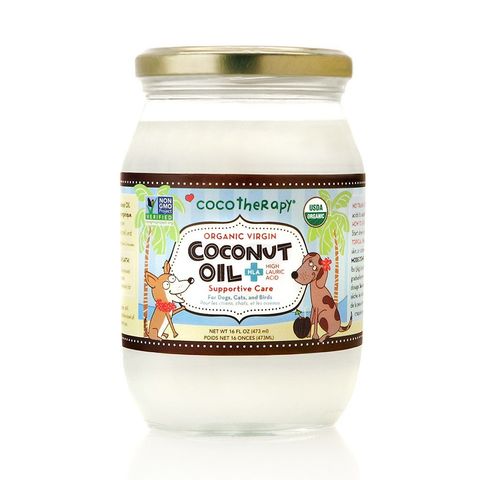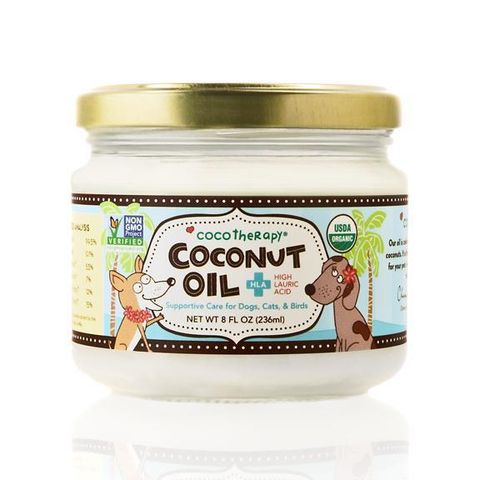
Recommended Article #1April24
Hi, Pet Parents Resources is a platform, where we share with you, what we research as pet parents ourselves. Here, we curate and give, what we hope would be, interesting to important informative articles, videos and even podcasts from our brand creators, experts, researchers, and more all over the world, to aid you in making better choices for your pets.
This recommended article "Can Coconut Oil Help with Ringworm?" is curated and sourced from CocoTherapy. If you loved this article, please do feel free to share it around.
Can Coconut Oil Help with Ringworm?
Growing up on a farm, we often had various skin problems – from insect bites to cuts and scrapes, and yes, even ringworm! When we did, our go-to remedy was always slathering on some virgin coconut oil (VCO). Not only did it help alleviate the uncomfortable itchiness associated with ringworm, but it also resolved the issue quickly.
In this blog post, we'll explain what ringworm is, how coconut oil can help, and the best way to use it with your pets. So, get ready to learn everything you need to know about using coconut oil for ringworm and why it's a scientifically proven remedy.
What Exactly Is Ringworm?
Despite its name, ringworm is actually a contagious skin infection caused by a fungus called tinea or dermatophytosis. These tiny organisms can be spread from person to person, or even from a pet to a human.
The infection usually appears as a red, itchy rash in the shape of a ring (hence the name) and typically affects areas like the arms and legs, scalp, and feet. Ringworm is not dangerous but can be uncomfortable and cause skin irritation.
Pets like dogs and cats are prone to ringworm, especially animals with compromised immune systems or those that live in overpopulated shelters. In animals, the infection appears as bald patches or scaly skin and can be harder to diagnose.
Traditional treatments for ringworm in pets include antifungal medications, shampoos, and creams. However, these treatments can sometimes cause side effects or be less effective in stubborn cases. This is where natural remedies like coconut oil can provide a helpful alternative.
Why Coconut Oil is an Effective Natural Remedy for Ringworm
At the start of this post, we talked about how our family used coconut oil to treat ringworm and other minor skin issues. But is there any scientific evidence to back up this practice? The answer is yes! In this section, we'll take a look at why coconut oil is an effective natural remedy for ringworm.
Powerful Anti-Fungal Properties
Studies have shown that VCO has potent anti-fungal properties that can help fight off a range of fungal infections, including candida and Aspergillus. In particular, the high lauric acid content in coconut oil has been shown to be particularly effective against fungi like ringworm. In another study, virgin coconut oil was shown to be as effective against ringworm, when compared to 1% Clotrimazole antifungal cream. Virgin coconut oil showed positive response after 12 weeks of treatment with respect to itch severity, clinical improvement, and changes in Dermatology Life Quality Index scores.
Anti-Inflammatory Benefits
VCO also has powerful anti-inflammatory properties that can help reduce the redness, irritation, and inflammation associated with ringworm. This can lead to a more comfortable and quicker recovery for your pet. What's more, since VCO has antibacterial properties, it can also help ward off secondary bacterial infections that may develop in the area.
Moisturizing Capabilities
Unlike some traditional antifungal treatments, which can dry out the skin, coconut oil helps to maintain moisture in the affected area. This is particularly beneficial for pets, as dry, irritated skin can cause them to scratch more, further exacerbating the issue.
Relief from Itching and Discomfort
One of the primary benefits of using VCO for ringworm treatment in pets is the relief it provides from itching. Itchy skin can lead to increased scratching and licking, which can slow down the healing process and increase the risk of secondary infections.
How to Use Coconut Oil to Treat Ringworm in Pets
To use coconut oil for treating ringworm in your pet, begin by cleaning the affected area with warm water and a mild, gentle shampoo. We love 4 Legger's Unscented Hypoallergenic Dog Shampoo with organic coconut oil, which is also safe for cats.
Gently pat the area dry, and then apply a thin layer of virgin coconut oil directly to the ringworm lesions. We recommend applying the VCO 2-3 times a day, ensuring the affected area remains clean and moisturized.
In addition to applying VCO topically, you should also follow some extra steps to prevent reinfection and help your pet recover more quickly:
- Give CocoTherapy Virgin Coconut Oil to your pet as an oral supplement by adding it to their diet. We recommend 1 teaspoon per 10 lb body weight.
- Bathe your pet regularly with a mild pet shampoo and consider adding a few drops of VCO to the shampoo to boost its antifungal properties.
- Wash your pet's bedding, blankets, and toys in hot water and soap to kill any lingering fungal spores.
- Clean and disinfect the areas where your pet spends time, including floors and surfaces.
- If possible, use a steam cleaner to kill any fungal spores on carpets, furniture, and other fabrics.
How Coconut Oil Supports Your Pet's Immune System
The medium-chain fatty acids (MCFAs) in coconut oil have powerful antimicrobial properties that help protect pets against various pathogens, including fungi, bacteria, and viruses.
By strengthening your pet's immune system, coconut oil can help them better resist infections – including ringworm. That's why it's a good idea to include coconut oil in your pet's diet, as well as using it topically for ringworm treatment.
By incorporating VCO into your pet's diet, you can help keep their immune system strong and boost their recovery from ringworm and other infections. Just remember to start with a small dose, gradually increasing the amount over time to avoid gastrointestinal upset. Check out our previous post for detailed information about using coconut oil with your pets.
The Bottom Line
Overall, coconut oil is a safe and effective natural remedy for treating ringworm in pets. With its potent antibacterial, antifungal, and anti-inflammatory properties, VCO can help soothe the skin, relieve itching and discomfort, moisturize dry patches, and even boost your pet's immune system to help fight off fungal infection.
So, if your furry friend is dealing with ringworm, consider giving coconut oil a try and watch as their skin condition improves. Just make sure to use a high-quality, human-grade VCO like CocoTherapy Organic Virgin Coconut Oil to ensure your pet gets the best possible results.
The good news is, you can purchase CocoTherapy Virgin Coconut Oil from our retailers today!
You may find more interesting reads from JOOF Holistic Pet today! Look out for loads of information on our product pages, social media, especially our Pet Parent Resources page.
JOOF Holistic Pet, a Singapore online pet store that focuses on the holistic well-being of your beloved furkid. Our recommended products aim to support and improve health, emotional and physical well-being, and help your pet have a better quality of life without compromise. Look out for Essential, Trendy and Premium quality pet products that are specially curated, with the pet parents concerns' as a priority.
This blog first appeared on the CocoTherapy website, where this article "Can Coconut Oil Help with Ringworm?" was curated and sourced from.
Original source: Can Coconut Oil Help with Ringworm?
Thank you for reading! We hope to bring you more informative and exciting articles from other resources and our varying retail brands. Through them, we hope more and more pet parents could become their pet's wellness heroes, proactively taking control of their pets’ foundational health from within, with JOOF Holistic Pet - www.joofholisticpet.sg 😊
Disclaimer:
JOOF Holistic Pet has curated and reproduced this article in good faith, which may contain an element of consumer opinion, but cannot be held responsible for any information inaccuracies in it or any use assumed from this information by the reader. JOOF Holistic Pet welcomes positive recommendations for holistic healthcare products, but does not necessarily endorse the author’s opinion. We acknowledge each animal is an individual and may react differently to the highlighted product/s, and that there may also be other similar effective products available.
General recommendations made by JOOF Holistic Pet are solely for informational and educational purposes, and are not a substitute for the appropriate veterinary care. It is important to always consult professional help if you have concerns about your furkid’s health.


